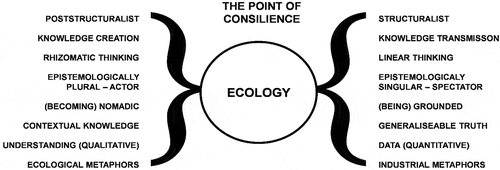As we observe the ongoing environmental and social catastrophe of neoliberalism (Monbiot Citation2016), as it plays out in our universities (Giroux Citation2014), the potential of ecological thinking to transform our educational institutions is only now starting to be realised (Kinchin Citation2024). Rather than just thinking about ecology in terms of environmental awareness, ecological thinking has the potential to initiate a paradigm shift within our universities. Code (Citation2006, 5) summarises ecological thinking as:
not simply thinking about ecology or about ‘the environment’, although these figure as catalysts among its issues. It is a revisioned mode of engagement with knowledge, subjectivity, politics, ethics, science, citizenship, and agency that pervades and reconfigures theory and practice. It does not reduce to a set of rules or methods; it may play out differently from location to location; but it is sufficiently coherent to be interpreted and enacted across widely diverse situations.
This is not about an ‘ecological takeover’, but rather about appreciating the value of different knowledge systems (i.e. epistemological pluralism), with ecology as the point of consilience between the natural sciences and arts and humanities, as described by celebrated ecologist E.O Wilson (Citation1998), and developed into a trajectory for repair of our universities by Kinchin (Citation2024) - see .
Figure 1. Ecology as the point of epistemological consilience (after Kinchin Citation2024).

Capra (Citation2005, 20–21) highlights a number of changes in perception that are required to support the adoption of ecological thinking as a series of shifts: from the parts to the whole; from objects to relationships; from objective knowledge to contextual knowledge; from quantity to quality; from measurement to mapping; from structures to process; and from contents to patterns. Many of these shifts will be intuitive for those with a background in ecological science. However, this ecological systems approach to the ‘wicked problem’ of education is not well served by a singular disciplinary way of thinking that limits our vision. The development of non-linear (rhizomatic) ways of thinking supports an ecological perspective and owes much to the poststructuralist/posthuman literature (e.g. Deleuze and Guattari Citation1987) that presents ideas that will be alien to many with a science background (the right-hand side of ). Addition of these ‘other worldviews’ to the educational discourse (represented on the left-hand side of ) can ‘affirmatively contribute to sustainable ways of living together in this world, taking inspiration from diverse philosophical, scientific and artistic traditions, as well as indigenous worldviews’ (Dedeoğlu and Zampaki Citation2023, 51).
The adoption of an ecological lens within university governance is already underway. University strategy documents are starting to adopt ecological terminology, such as ‘teaching-research ecosystems’, ‘sustainability’, ‘resilience’, but without demonstrating any understanding of what these terms mean or how the concepts might be used as tools in academic leadership. In addition, these terms are usually framed within an ‘eco-management discourse’ that links sustainability with growth (rather than de-growth – Prádanos Citation2015) and links resilience with grit (rather than adaptability – Holling Citation1996) in order to maintain the neoliberal focus on consumerism.
In order to achieve an epistemological consilience, those in management positions will need support to enrich their understanding of ecological principles, while those with expertise in ecology will need support to reconsider ecological concepts through a postructuralist lens to enrich our understanding of their application to complex social systems. This requires a much deeper and nuanced dialogue across our university campuses than is currently found. Discourse needs to evolve from an exclusive focus on technical matters such as budgets and building programmes. While these are important, they have a tendency to drown out the underpinning discourses that elaborate professional values with the result that we leave neoliberal doctrines unchallenged as if there is no alternative (Donskis Citation2019). If we are to move towards an ecological university (Kinchin Citation2023) with its promise of increased social justice, those involved in Biological Education will have to adopt a central role in helping to curate ecological thinking as the natural language of educational development. If universities are to shed the yoke of neoliberalism, then biological educators may prove to be the lynchpin in the transformatory process.
Disclosure statement
No potential conflict of interest was reported by the author(s).
References
- Capra, F. 2005. “Speaking Nature’s Language: Principles for Sustainability.” In Ecological Literacy: Educating Our Children for a Sustainable World, edited by M. K. Stone and Z. Barlow, 18–29. San Francisco: Sierra Book Club Books.
- Code, L. 2006. Ecological Thinking: The Politics of Epistemological Location. Oxford: Oxford University Press.
- Dedeoğlu, Ç., and N. Zampaki. 2023. “Posthumanism for Sustainability: A Scoping Review.” Journal of Posthumanism 3 (1): 33–57. https://doi.org/10.33182/joph.v3i1.2761.
- Deleuze, G., and F. Guattari. 1987. A Thousand Plateaus: Capitalism and Schizophrenia. Translated by B. Massumi. London: Bloomsbury.
- Donskis, L. 2019. “Toward an Educational Dystopia? Liquid Evil, TINA, and Postacademic University.” In Academia in Crisis: The Rise and Risk of Neoliberal Education in Europe, edited by L. Donskis, I. Sabelis, F. Kamsteeg, and H. Wels, 11–35. Leiden: Brill.
- Giroux, H. A. 2014. Neoliberalism’s War on Higher Education. Chicago: Haymarket Books.
- Holling, C. S. 1996. “Engineering Resilience vs. Ecological Resilience.” In Engineering within Ecological Constraints, edited by P. C. Schultze, 31–43. Washington, DC: National Academy Press.
- Kinchin, I. M. 2023. “Five Moves Towards an Ecological University.” Teaching in Higher Education 28 (5): 918–932. https://doi.org/10.1080/13562517.2023.2197108.
- Kinchin, I. M. 2024. How to Mend a University: Towards a Sustainable Learning Environment in Higher Education. London: Bloomsbury.
- Monbiot, G. 2016. How Did We Get into This Mess? Politics, Equality, Nature. London: Verso.
- Prádanos, L. I. 2015. “The Pedagogy of Degrowth: Teaching Hispanic Studies in the Age of Social Inequality and Ecological Collapse.” Arizona Journal of Hispanic Cultural Studies 19 (1): 153–168. https://doi.org/10.1353/hcs.2016.0029.
- Wilson, E. O. 1998. Consilience: The Unity of Knowledge. London: Abacus.
